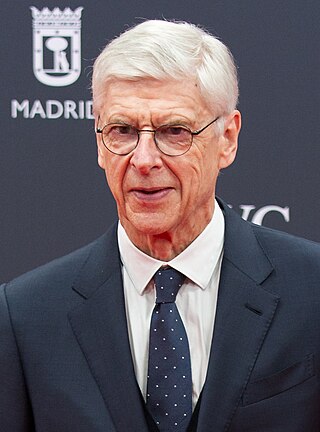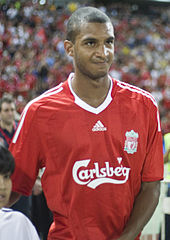
Patrick Paul Vieira is a French professional football manager and former player who is the head coach of Ligue 1 club Strasbourg. He was named in the FIFA 100 of greatest living footballers in 2004.

Paul John Gascoigne, nicknamed Gazza, is an English former professional footballer who played as an attacking midfielder. Regarded as one of the best playmakers of his generation and one of the best English footballers of all time, Gascoigne is described by the National Football Museum as "widely recognised as the most naturally talented English footballer of his generation". Gascoigne was immensely popular during his playing career, with television broadcaster Terry Wogan calling him "probably the most popular man in Britain today" in September 1990, and public interest in and adoration for him came to be known as "Gazzamania".

The Emirates Stadium is a football stadium in Holloway, London, England. It has been the home stadium of Arsenal Football Club since its completion in 2006. It has a current seated capacity of 60,704, making it one of the largest football stadiums in England by capacity.

Fernando Jacob Hubertina Henrika Ricksen was a Dutch professional footballer who played as a right back and central midfielder. After winning Eerste Divisie titles with Fortuna Sittard and AZ, he joined Rangers for £3.75 million in 2000. In six years with the club from Glasgow, he won two Scottish Premier League titles, two Scottish Cups and three Scottish League Cups. He left in 2006 for Zenit Saint Petersburg, initially on loan, and won honours including the UEFA Cup and UEFA Super Cup in 2008. He was dismissed by Zenit in 2009, and spent the final years of his career back at Fortuna Sittard. Internationally, he earned 12 caps for the Netherlands between 2000 and 2003.

Paul Charles Merson is an English former professional footballer, manager, commentator and sports television pundit for Sky Sports.

Jermaine Lloyd Pennant is a retired English professional footballer who played as a winger. Pennant made over 350 league appearances for 15 clubs, and scored 25 league goals.

Mikel Arteta Amatriain is a Spanish professional football manager and former player who is the manager of Premier League club Arsenal.

Alcohol advertising is the promotion of alcoholic beverages by alcohol producers through a variety of media. Along with nicotine advertising, alcohol advertising is one of the most highly regulated forms of marketing. Some or all forms of alcohol advertising are banned in some countries. There have been some important studies about alcohol advertising published, such as J.P. Nelson's in 2000.

Joseph Anthony Barton is an English professional football manager and former player who played as a midfielder. Barton made 269 appearances in the Premier League, including 130 for Manchester City; he was most recently the manager of League One side Bristol Rovers.
In English football, "The Invincibles" is a nickname used to refer to the Preston North End team of the 1888–89 season, managed by William Sudell, and the Arsenal team of the 2003–04 season managed by Arsène Wenger. Preston North End earned the nickname after completing an entire season undefeated in league and cup competition, while Arsenal were undefeated in the league in a run that stretched to a record 49 games. The actual nickname of the Preston team was the "Old Invincibles" but both versions have been in use although Arsenal is the only team to ever finish a 38-match season undefeated.

The Premier League Manager of the Season is an annual association football award presented to managers in England. It recognises the most outstanding manager in the Premier League each season. The recipient is chosen by a panel assembled by the league's sponsors and is announced in the second or third week of May. The award was established during the 1993–94 season by then-league title sponsor Carling. For sponsorship purposes, it was called the Carling Manager of the Year from 1994 to 2001, the Barclaycard Manager of the Year from 2001 to 2004, and since 2004 known as the Barclays Manager of the Season.
The 2003–04 season was Arsenal Football Club's 12th season in the Premier League and their 78th consecutive season in the top flight of English football. It began on 1 July 2003 and concluded on 30 June 2004, with competitive matches played between August and May. The club ended the Premier League campaign as champions without a single defeat – a record of 26 wins and 12 draws. Arsenal fared less well in the cups, eliminated in the FA Cup and League Cup semi-finals to Manchester United and Middlesbrough respectively, and at the quarter-final stage of the UEFA Champions League to Chelsea.
The 2002–03 season was Arsenal Football Club's 11th season in the Premier League and their 77th consecutive season in the top flight of English football. The club retained the FA Cup, a feat last achieved by Tottenham Hotspur in 1982, but finished runners-up to Manchester United in the Premier League. In the UEFA Champions League, defeat to Valencia in the second group stage meant Arsenal exited the competition at the same round for the second successive year.

Jack Andrew Garry Wilshere is an English football coach and former professional player who played as a midfielder. He is the head coach of the Arsenal under-18 team.

Although Arsenal and Manchester United have frequently been in the same division in English football since 1919, the rivalry between the two clubs only became a fierce one in the late 1990s and early 2000s, when the teams regularly competed against each other for the Premier League title and FA Cup. There was also an enmity between the managers, Arsenal's Arsène Wenger (1996–2018) and United's Sir Alex Ferguson (1986–2013), and club captains Patrick Vieira and Roy Keane, and their contests often involved on-field trouble – seven red cards were shown in matches from February 1997 to February 2005. The league fixture in September 2003, known as the "Battle of Old Trafford", was marred by a mêlée instigated by Arsenal players, who felt striker Ruud van Nistelrooy had cheated to get Vieira sent off. A season later, Manchester United ended Arsenal's unbeaten run in controversial circumstances, which led to more disorder, this time in the tunnel. Manchester United lead in trophies won with 67 honours compared to Arsenal's 48.

Arsène Charles Ernest Wenger is a French former football manager and player who is currently serving as FIFA's Chief of Global Football Development. He was the manager of Arsenal from 1996 to 2018, where he was the longest-serving and most successful in the club's history. His contribution to English football through changes to scouting, players' training and diet regimens revitalised Arsenal and aided the globalisation of the sport in the 21st century.

Arsenal F.C. are an English professional football club based in Holloway, North London. The club's first European football match was played against Copenhagen XI on 25 September 1963, and they have since participated in European club competitions on several occasions, most of which organised by the Union of European Football Associations (UEFA). Arsenal have won two European honours: the Inter-Cities Fairs Cup in 1970 and the Cup Winners' Cup in 1994 – the latter title recognised by the European confederation. The club played the 1994 European Super Cup and repeated its presence in the following year's Cup Winners' Cup final. Arsenal also reached the final of the UEFA Cup in 2000 and the Europa League in 2019, and became the first London team to appear in a UEFA Champions League final, in 2006.

The 2016–17 Premier League was the 25th season of the Premier League, the top English professional league for association football clubs, since its establishment in 1992, and the 118th season of top-flight English football overall. The season began on 13 August 2016 and concluded on 21 May 2017. Fixtures for the 2016–17 season were announced on 15 June 2016.

The issue of smoking in association football is a historical controversy. Traditionally, football managers would smoke on the touch-line as well as players smoking away from the pitch. However, growing anti-smoking trends have led to a number of restrictions being put in place surrounding them. Smoking is now largely banned from stadiums around the world, but some individual players and managers have continued to smoke.

The Arsenal F.C.–Manchester City F.C. rivalry is a rivalry between English professional football clubs Arsenal and Manchester City. Arsenal play their home games at the Emirates Stadium, while Manchester City play their home games at the City of Manchester Stadium.




















